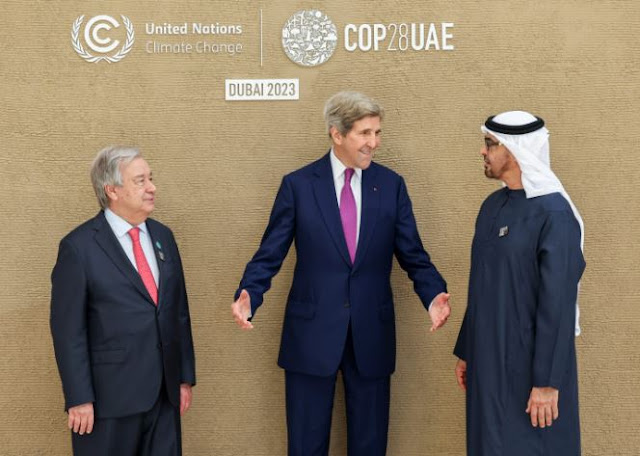From Pariah to Powerhouse: How Nuclear Energy Became Climate Change's New Hero.
 |
| John Kerry at COP28. Image: Collected |
Dubai, UAE:
In a landmark move at the U.N. Climate Change Conference (COP28), U.S. Special Presidential Envoy for Climate John Kerry joined leaders and ministers from four continents to announce the Declaration to Triple Nuclear Energy. This historic agreement recognizes the critical role of nuclear power in achieving global net-zero greenhouse gas emissions by 2050 and limiting global warming to 1.5 degrees Celsius.
The Declaration emphasizes the need for secure nuclear supply chains and urges shareholders of major financial institutions, including the World Bank, to support nuclear energy projects through their lending policies. This vital financial backing will be instrumental in accelerating the deployment of new nuclear plants and ensuring the safe and sustainable operation of existing facilities.
Triple Global Nuclear Capacity: Endorsing countries aim to triple global nuclear power capacity by 2050, providing a clean and reliable source of electricity for millions worldwide.
Financial Backing: The Declaration encourages shareholders of the World Bank, international financial institutions, and regional development banks to include nuclear energy in their lending portfolios.
Safety and Security: The commitment emphasizes the importance of robust safety and security measures throughout the nuclear fuel cycle, from uranium mining to waste disposal.
Technological Innovation: Endorsing countries pledge to collaborate on research and development of advanced nuclear technologies, including small modular reactors and nuclear fusion.
Countries Endorsing the Declaration: Africa: Ghana, Morocco; Asia: Bulgaria, Japan, Mongolia, Republic of Korea, Romania, Slovakia, Slovenia; Europe: Canada, Czech Republic, Finland, France, Hungary, Moldova, Netherlands, Poland, Sweden, Ukraine, United Kingdom; North America: United States; Middle East: United Arab Emirates.
This collective action represents a significant turning point in the global fight against climate change. Nuclear energy has long been a controversial topic, but its potential to deliver clean, baseload power is undeniable. By tripling nuclear capacity, we can create a more sustainable future for generations to come.
U.S. Special Presidential Envoy for Climate John Kerry: "This Declaration is a game-changer. Nuclear energy is not just a climate solution, it's an economic and security imperative. By working together, we can unlock the power of the atom and build a cleaner, safer world."
Director General of the International Atomic Energy Agency (IAEA) Rafael Grossi: "The Declaration sends a powerful message: nuclear energy is back on the table as a critical tool for climate action. The IAEA is committed to supporting countries in their safe and sustainable deployment of nuclear power."
The road ahead won't be easy. Challenges remain in terms of public perception, waste management, and non-proliferation. But with international cooperation, technological advancements, and a shared commitment to clean energy, the Declaration to Triple Nuclear Energy marks a giant leap towards a brighter, climate-resilient future.